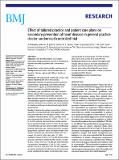| dc.contributor.author | Murphy, Andrew W. | en |
| dc.contributor.author | Byrne, Molly | en |
| dc.contributor.author | Newell, John | en |
| dc.date.accessioned | 2010-10-13T16:16:01Z | en |
| dc.date.available | 2010-10-13T16:16:01Z | en |
| dc.date.issued | 2009 | en |
| dc.identifier.citation | Murphy, A., Cupples, M., Smith, S., Byrne, M., Byrne, M., Newell, J., et al. (2009). Effect of tailored practice and patient care plans on secondary prevention of heart disease in general practice: cluster randomised controlled trial. BMJ, 339, b4220. | en |
| dc.identifier.uri | http://hdl.handle.net/10379/1332 | en |
| dc.description.abstract | Objective To test the effectiveness of a complex intervention designed, within a theoretical framework, to improve outcomes for patients with coronary heart disease.
Design Cluster randomised controlled multicentre trial.
Setting General practices in Northern Ireland and the Republic of Ireland, regions with different healthcare systems.
Participants 903 patients with established coronary heart disease registered with one of 48 practices.
Intervention Tailored care plans for practices (practice based training in prescribing and behaviour change, administrative support, quarterly newsletter), and tailored care plans for patients (motivational interviewing, goal identification, and target setting for lifestyle change) with reviews every four months at the practices. Control practices provided usual care.
Main outcome measures The proportion of patients at 18 month follow-up above target levels for blood pressure and total cholesterol concentration, and those admitted to hospital, and changes in physical and mental health status (SF-12).
Results At baseline the numbers (proportions) of patients above the recommended limits were: systolic blood pressure greater than 140 mm Hg (305/899; 33.9%, 95% confidence interval 30.8% to 33.9%), diastolic blood pressure greater than 90 mm Hg (111/901; 12.3%, 10.2% to 14.5%), and total cholesterol concentration greater than 5 mmol/l (188/860; 20.8%, 19.1% to 24.6%). At the 18 month follow-up there were no significant differences between intervention and control groups in the numbers (proportions) of patients above the recommended limits: systolic blood pressure, intervention 98/360 (27.2%) v control, 133/405 (32.8%), odds ratio 1.51 (95% confidence interval 0.99 to 2.30; P=0.06); diastolic blood pressure, intervention 32/360 (8.9%) v control, 40/405 (9.9%), 1.40 (0.75 to 2.64; P=0.29); and total cholesterol concentration, intervention 52/342 (15.2%) v control, 64/391 (16.4%), 1.13 (0.63 to 2.03; P=0.65). The number of patients admitted to hospital over the 18 month study period significantly decreased in the intervention group compared with the control group: 107/415 (25.8%) v 148/435 (34.0%), 1.56 (1.53 to 2.60; P=0.03).
Conclusions Admissions to hospital were significantly reduced after an intensive 18 month intervention to improve outcomes for patients with coronary heart disease, but no other clinical benefits were shown, possibly because of a ceiling effect related to improved management of the disease. | en |
| dc.format | application/pdf | en |
| dc.language.iso | en | en |
| dc.rights | Attribution-NonCommercial-NoDerivs 3.0 Ireland | |
| dc.rights.uri | https://creativecommons.org/licenses/by-nc-nd/3.0/ie/ | |
| dc.subject | General practice | en |
| dc.title | Effect of tailored practice and patient care plans on secondary prevention of heart disease in general practice: cluster randomised controlled trial. | en |
| dc.type | Article | en |
| dc.local.publisherstatement | http://www.bmj.com/content/339/bmj.b4220.full | en |
| dc.description.peer-reviewed | peer-reviewed | en |
| dc.contributor.funder | Health Research Board | en |
| dc.contributor.funder | Irish Heart Foundation | en |
| nui.item.downloads | 556 | |


